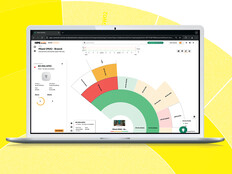How Ulta Beauty Digitized the In-Store Experience
Ulta’s Whittemore said the company focused most of its efforts last year on deploying technology to its nearly 1,200 U.S. stores. It was able to rapidly support a buy-online, pickup in-store program because of technologies it had been deploying throughout the country.
“We’d been on a journey for a number of years to introduce the Meraki stack into our stores,” Whittemore said. “The number of application changes that we had to go through in a short period of time to implement omnichannel capabilities that would unlock store inventory when our guest didn’t want to walk through the door — it was profound. The templating capabilities within the Meraki stack enabled us to do with the push of a button what would have taken us hundreds of hours to do manually.”
The changes at Bosch, however, were of a different sort. Although its home appliances, power tools, auto parts and other products are found in homes, cars and offices around the world, the company distributes products through sales channels, not directly to consumers. So it had to rethink its manufacturing processes, explained Bernd Heinrichs, Bosch’s executive vice president and chief digital officer of mobility solutions.
“For us, it became very clear that in these difficult times, when the production floor is sometimes empty, we need to automate even more than we did before,” he said. “So we encouraged our people to optimize their environment — and to ‘bot-ify’ their environment, to learn how to implement bots that can increase efficiency and productivity at their plants. Data, in that case, is at the core of all that — it’s at the heart of all that we are doing. If you have the data, you’re capable of making predictions and deploying automation in a really rapid way.”
MORE FROM BIZTECH: How businesses can embrace the work from anywhere model.
Organizations Will Need Less Physical Space Post-Pandemic
Australia’s university system was hit hard by the pandemic, with revenue declines of 20 percent expected for the next several years, said John Dewar, La Trobe University’s president. Like other universities, it shifted rapidly to online learning environments. And to make up for those revenue shortfalls, it’s reducing “back of the house” headcount, Dewar said.
“We have to transform digitally and we have to do it quickly, primarily because we have to remove costs from the organization to address the revenue downturn,” Dewar said.
La Trobe is also reshaping its campuses. Online learning will continue to be an option for students post-pandemic, reducing its need for classroom space, and staff have “developed an appetite for flexible work,” Dewar said, diminishing its need for administrative space. As a result, La Trobe’s campuses will have a different look and feel post-pandemic.
“We estimate that we’ll reduce the use of our real estate by 25 percent,” he said. “So, we’re looking at which buildings we can withdraw from or empty out of our own staff and then package them up to try and attract other tenants. Our campuses will become much more diverse places, where there’s a university going on but there’s a lot of other stuff going on around it. Who knows what it might be?”
La Trobe and other colleges are not alone in preparing for a post-pandemic world that will look significantly different from that of 2019. In fact, no walk of life is likely to return to its pre-pandemic realities.
“I think we have to accept that what was disrupted by the pandemic is not going to go back to the status quo,” Whittemore said. “We feel at Ulta that the acceleration of the pace of change we experienced last year will only continue. We need to partner with individuals who will take the mundane and the non-value-add tasks away from our associates who are delivering value.”
To keep up with our coverage of Cisco Live 2021, bookmark this page, follow us on Twitter at @BizTechMagazine or the official conference Twitter account, @CiscoLive, and join the conversation using hashtag #CLUS.











